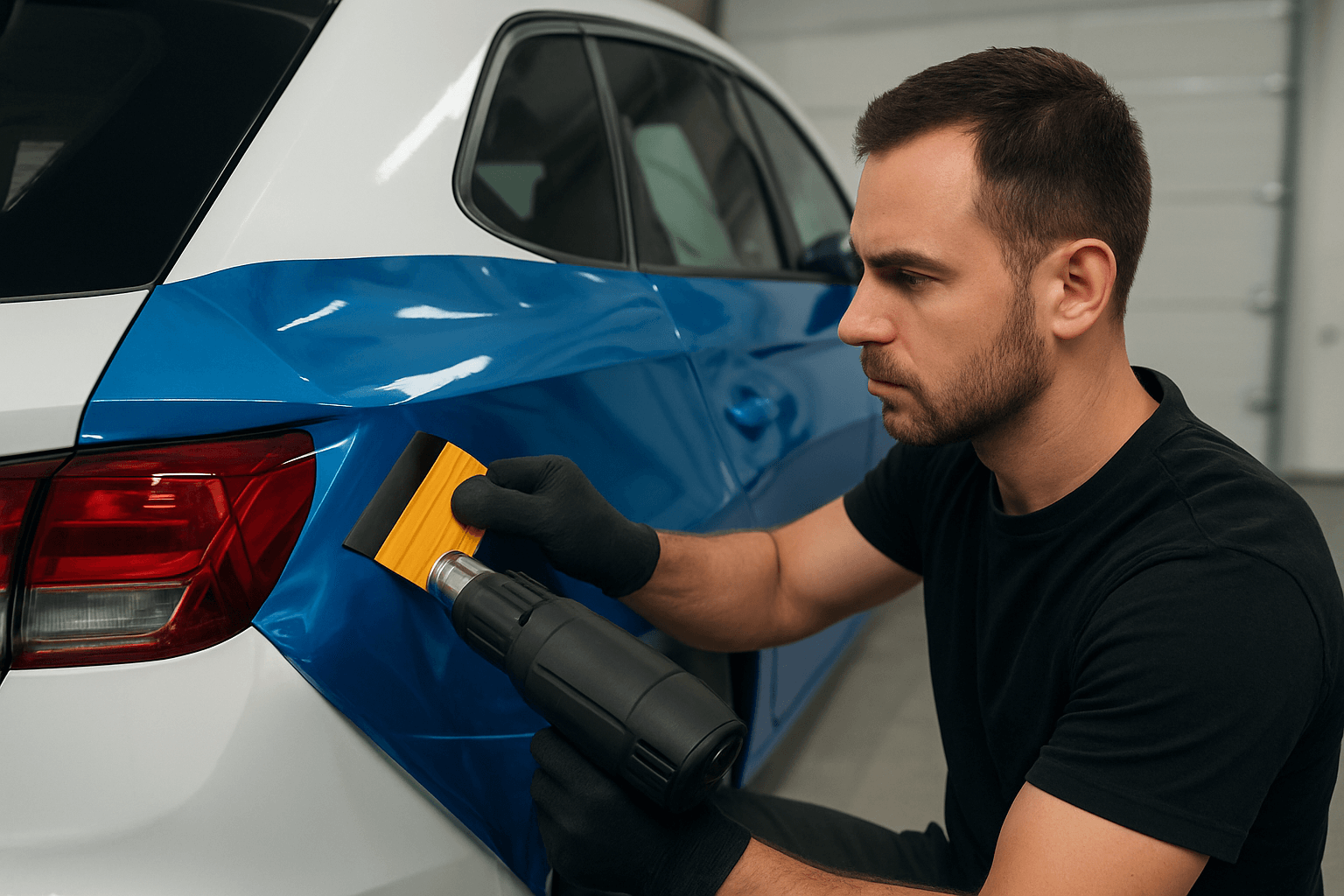Car wraps are everywhere in the UK right now. In 2024, the UK auto wrap films industry size was reached to USD 148 million. By 2030, it will likely jump to USD 496 million with a high CAGR of 23.7%. That growth shows how much people love car wraps. They desire fashionable appearance, protection, and flexibility without the high prices of paint. It is critical to consider the advantages and disadvantages of wrapping a car before making an appointment. Let’s see how wraps work, what are the most popular designs, what should you consider before making a choice?
Understanding Car Wrapping
A car wrap is a strong vinyl film placed over the paint. It covers your car completely or just certain areas depending on the design. Think of it as a protective skin that adds both beauty and safety. It protects original paint while giving a new, stylish look. The pros and cons of getting car wrapped always depend on the type and quality of film used. Wraps are not permanent, making them flexible for drivers who want changes later.

How Does Car Wrapping Work?
The procedure starts with cleaning and preparing the surface. Every dust particle must be removed. Then the film is applied with care, usually premium cast vinyl. The film is heated and stretched to fit around the curves. Installers use tools like squeegees to smooth the wrap down. The result looks like a flawless coat of paint. The car wrap installation time in the UK depends on size and detail. Small cars may take one or two days. Complex wraps can take longer, sometimes four or five days.
Key Types of Car Wraps
Here are the most common wrap types in the UK today:
- Full Wraps: The whole car is covered for a complete transformation.
- Partial Wraps: Only specific sections such as hoods and roofs are covered.
- Commercial Wraps: Businesses utilize them in branding and advertisement.
- Colour Changes: Motorists will receive new colours without the need to paint the vehicle.
- Specialty Finishes: Matte, satin, gloss, metallic and even graffiti-like wraps.
Every type has its own peculiarities and features, and it is better to know what are the advantages and disadvantages of wrapping a car to make the right decision.
Finish Comparisons: What’s Pop in the UK?
Matte Finish
- Pros: Sleek, bold and trendy in the UK now. Matte metallics such as satin titanium and emerald green are popular.
- Cons: Easily shows dust and dirt. Many owners wash cars daily.
Gloss Finish
- Pros: Brilliant shine similar to expensive paint, but far more affordable. Easy to clean.
- Cons: Shows scratches and swirl marks faster than other finishes.
Satin Finish
- Pros: Perfect balance between gloss and matte. Looks stylish and lasts up to seven years.
- Cons: Not many colours available, still needs careful handling.
Structure (Textured) Vinyl
- Pros: Designs like carbon fibre or brushed steel. They look very unique and last up to nine years.
- Cons: Dirt can collect in textures, and installation needs skilled hands.
Understanding these finishes helps drivers weigh the car wrapping pros and cons of the UK before choosing.
Mechanisms of Car Wrapping in Detail
Good vinyl wraps are pressure-sensitive. They stick firmly when applied with proper heat. Many come with air-release channels, preventing bubbles or wrinkles. This makes the finish smooth and professional. Wraps also have UV protection. That feature matters in the UK, where cloudy skies still let in harmful rays. UV resistance keeps colours bright and prevents fading. That’s why many installers stress the importance of premium films when explaining the pros and cons of wrapping your car.
How to Maintain Car Wraps Effectively
Wraps need proper care to look their best. Here are simple tips:
- Wash with mild, pH balanced soap by hand.
- Never use high-pressure water or strong chemicals.
- Wipe up bird droppings or sap immediately
- Park in the shade as much as possible to avoid UV damage.
- Have professional assistance to repair peeling edges or small bubbles immediately.
Following these steps helps wraps last longer, making the pros and cons of car wrap more favourable.

Benefits of Car Wrapping
Car wrapping has many strong benefits that make it popular in the UK:
- Cost-effective style updates, cheaper than high-end paint jobs.
- Protects paint from chips, scratches, and fading.
- Easy to remove, keeping resale value strong.
- Offers unique styles and trending car wrap designs UK.
- Businesses can use wraps for mobile advertising.
These benefits explain why vinyl wrapping a car has become widely embraced as an alternative to painting cars.
Potential Drawbacks and Risks
There are also drawbacks to consider before deciding on a wrap:
- Initial price can be high, depending on car size and design. The vehicle wrap cost in the UK often reaches thousands of pounds.
- Durability depends on climate. Wraps usually last 5 to 7 years, sometimes longer with proper care.
- Installers vary in skill. Poor work can cause peeling or even paint damage.
- Certain finishes need special cleaning and maintenance.
These dangers are the reasons why one ought to learn more about the pros and cons of car wrap.
Choosing the Right Car Wrap
Picking the right wrap depends on your goal. Here are simple points:
- Matte works for stealth and luxury looks.
- Gloss brings shine and easier cleaning.
- Satin gives a balance of shine and elegance.
- Textured wraps give a bold, standout statement.
Drivers should always choose certified installers and high-quality materials. That decision saves money and ensures better results. Checking the car wrap legal requirements in the UK is also necessary. Some rules apply to colours and advertising wraps. Taking time to learn those rules avoids problems later.
Conclusion
Car wrapping combines design and protection, offering a modern solution for drivers. It transforms vehicles, safeguards paint, and allows flexible style changes. The pros and cons of getting car wrapped show it’s both practical and stylish. Businesses benefit through advertising, while individuals enjoy personal style freedom.
For UK drivers, car wrapping stands as a reliable and creative choice. The growing demand and popularity prove how powerful the trend has become. Despite the car wrapping pros and cons of the UK, more people now see wraps as an exciting option for their vehicles.
Do you want a car that grabs attention? Talk to a certified installer today. Explore your choices, compare finishes, and match them with your goals. Whether it’s matte luxury, gloss shine, or trending car wrap designs UK, wraps make it possible. Start your journey now and enjoy the benefits of stylish, lasting car wraps.
FAQs
How long does a car wrap last?
With proper care, a quality vinyl wrap can last in the UK within 5-7 years. High-end brands such as TeckWrap UK provide durable films that can withstand British weather.
Can wrapping damage the paint?
Absolutely not, professionally installed vinyl wraps do not destroy factory paint, rather they protect it. It is able to guard against UV rays, road debris and minor scratches.
Is wrapping cheaper than painting?
In most cases, yes. A full car repaint in the UK could cost between £2500 - £4000 or premium wrap £1200 - £2500 depending on car size and finish.
What finishes are available?
The UK car wraps come with different finishes; matte, gloss, satin, metallic, chrome and carbon fibre. To meet every taste, brands such as TeckWrap UK provide a wide range of colours and textures.
Can I wash a wrapped car normally?
Yes, but hand washing is recommended. Automatic car washes may have brushes and they may damage the film. Use a pH-neutral shampoo for the best results.
